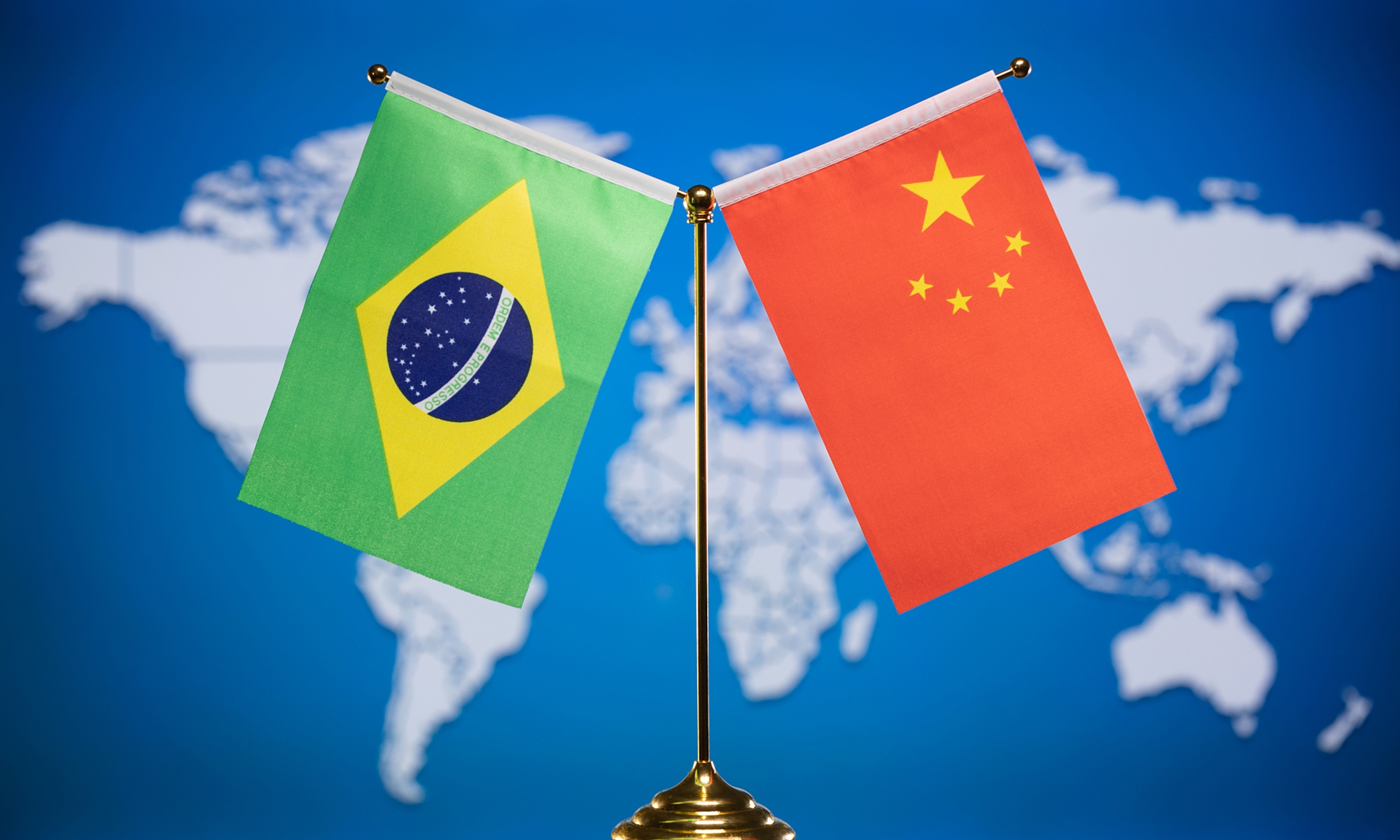
China and Brazil. Photo: VCG
Brazil's President Luiz Inacio Lula da Silva, "an old friend of the Chinese people," starts his state visit to China on Wednesday. This is Lula's fifth visit to China, his first visit to a country outside the Americas since he took office as the president in January and his fastest trip to China as the Brazilian president. The Brazilian side has high expectations for Lula's visit, saying that it would be a state visit of "economic, trade and political importance." There are also widespread expectations that China-Brazil relations will enter a new phase of "close political and economic relations." Under the strategic leadership of the two heads of state, China and Brazil, side by side, will show the world a model of South-South cooperation in depth.
Public opinion generally notes two outstanding features of Lula's China trip this time. The first feature is that the lineup accompanying Lula is impressive. At the official level, this visit includes senior officials from various important departments. The number of visiting members of the Brazilian Congress has increased from, initially, 27 to 39, and the President of the Brazilian Senate will also come to China. In the political ecology of Latin America, such "political unanimity" is rare. At the business level, despite a mega-delegation consisting of more than 200 entrepreneurs, more companies still hope to join the group and hundreds of business representatives have already "flocked to China" before Lula's visit. All these show that Brazil, from the political arena to the society, has a burning expectation for the development of China-Brazil relations. Second, Lula's visit to China was previously postponed due to the president's health. Right after he has recovered, Lula travels to China with a full schedule. It can be said that he comes to China with full sincerity, which also foretells that the results of cooperation between the two countries will be comprehensive in multiple areas.
As the two largest developing countries in the Eastern and Western Hemispheres, China and Brazil clearly share common interests beyond the high degree of complementarity in the economic and trade fields. Both countries face the heavy responsibility of economic and social development, and Brazil has, on many occasions, expressed its desire to learn from China in areas such as poverty reduction. By strengthening strategic alignment and coordination, China and Brazil will jointly promote the historical process of developing countries' pursuit of modernization on their respective paths.
At the same time, both countries are important members of organizations and mechanisms such as the United Nations, the World Trade Organization, and BRICS. Close communication and coordination between the two countries will help safeguard the overall interests of developing countries and promote the development of the international order toward greater fairness, justice and rationality. In this sense, China-Brazil relations have gone beyond the bilateral scope and have important global influence.
Brazil has a population of over 200 million and is a "big player" among Latin American countries, as well as an important emerging economic power. After his third inauguration as President of Brazil, Lula vowed to "make Brazil a global player" and showed great ambition as a major power. China strongly supports this, and we sincerely hope that Brazil, as a leader among developing countries, will play a greater constructive role in the international community.
Many Western media and public opinion, when discussing Brazil's grand strategy, always focus on whether it should "lean toward" the US or China. This discussion itself is extremely disrespectful to Brazil and is full of short-sighted and narrow-minded hegemonic attitudes. China is also a victim of hegemonism and never points fingers at Brazil's internal and external affairs. Moreover, we believe that Brazilians themselves are the ones who know best where their interests lie.
It's worth noting that the outside world has paid much attention to whether Lula will discuss the Ukraine crisis with China during his visit. Prior to meeting with US President Joe Biden, Lula proposed a peace plan called the "Peace Club," which suggested the formation of a multilateral organization including countries such as China and India to mediate conflicts and called for respect for China's prominent role in safeguarding world peace and mediating international conflicts. Although the US reacted coldly, the international community has broad expectations for China and Brazil to work together to promote peace talks. Ahead of his visit, Lula reiterated that he would discuss the possibility of ending the Ukraine crisis through dialogue with China. In fact, neither China nor Brazil is a party to the Russia-Ukraine conflict. However, both countries have similar views on urging peace talks, which shows that although the West is still fanning the flames, the voice of the international community's peace forces is growing louder.
The Chinese people like Brazil, a passionate and lively country, and they welcome President Lula's visit. Previously, China had expressed its expectations for Lula's visit with some "news": to open up new prospects in China-Brazil relations in the new era at the heads-of-state level, bring the comprehensive strategic partnership to a new height, and make new contributions to regional and global stability and prosperity. We expect that based on traditional bilateral trade and multilateral cooperation, the friendship between China and Brazil could further flourish in a new historical stage, shining in the light of mutual learning among civilizations and bringing more new inspirations to the development of human society.




